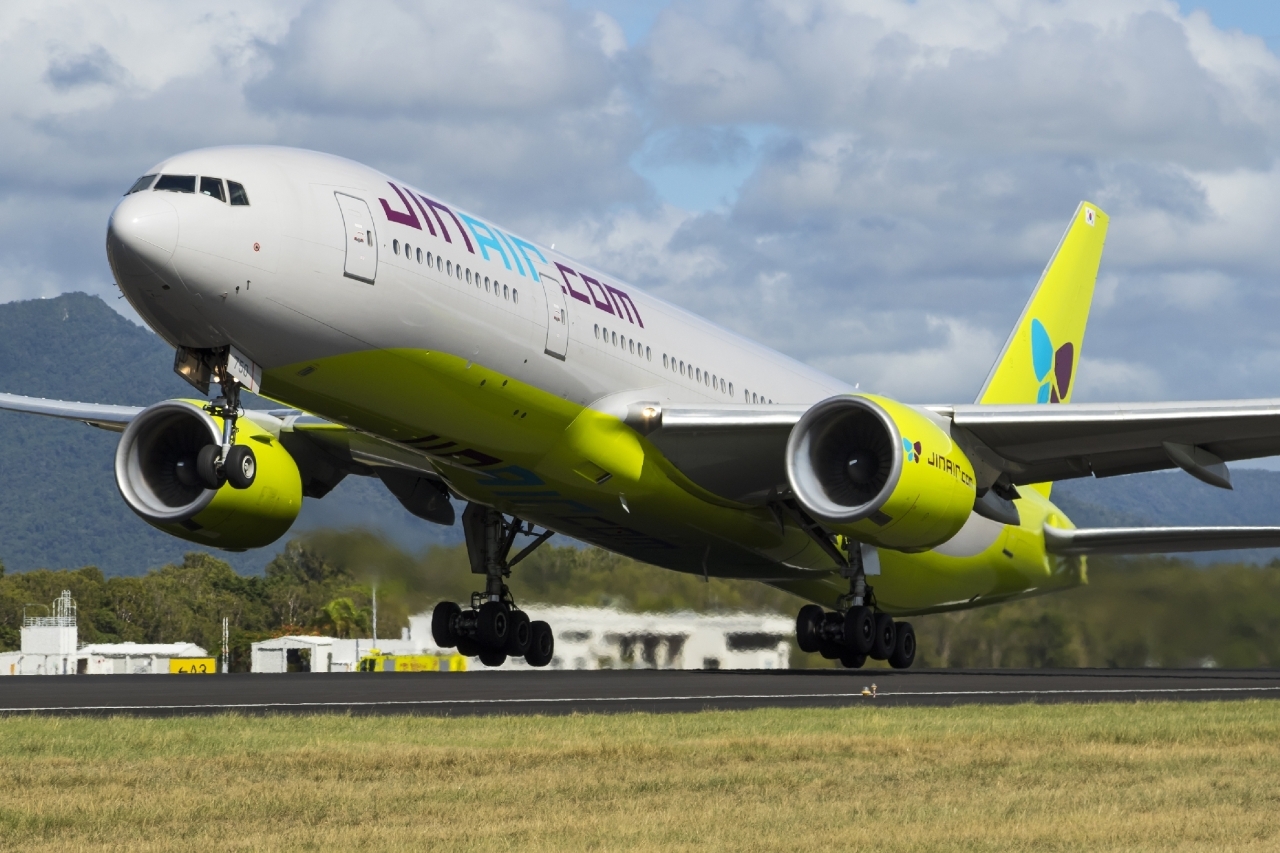
Jin Air Co., the budget carrier unit of Korean Air Lines Co., said Monday it has begun transporting cargo to the United States to survive the coronavirus pandemic.
Jin Air has become the country's first low-cost carrier to deliver cargo to the US.
Jin Air delivered 23 tons of displays and other high-end electronics on its B777-200ER passenger jet from Incheon to Los Angeles on Sunday, the company said in a statement.
"The company is planning to deliver more value-added cargo to the US and Europe using the B777-200ER planes," it said.
Last month, Jin Air started to operate a B777-200ER jet, which had been converted into a cargo plane under approval from the government, on routes from Incheon to Bangkok and Qingdao.
It was the first time for a local budget carrier to convert a passenger jet to carry cargo to ride out the virus crisis.
Jin Air said it plans to expand cargo delivery using cargo seat bags to cut costs and explore a new income source.
The carrier currently operates 27 passenger jets, which are composed of four B777-200ERs and 23 B737-800s, on five international routes and 15 domestic routes.
It had provided flights on 32 international routes to Guam, Hawaii and Asian countries, as well as four domestic routes, before the pandemic hit the airline industry early this year.
In June, its parent Korean Air began to carry cargo in cargo seat bags in line with global airlines, which are now using their passenger planes for cargo flights, either by using cargo seat bags or removing seats.
Cargo-carrying demand has jumped this year as more than 180 countries and territories closed their borders or imposed entry restrictions on incoming passengers amid virus fears.
Increased cargo demand helped airlines offset a sharp decline in air travel demand in the April-June quarter.
On a parent basis, Korean Air shifted to a net profit of 162.4 billion won ($137 million) in the second quarter from a net loss of 80.78 billion won a year earlier as it focused on obtaining more cargo-carrying orders. (Yonhap)
Jin Air has become the country's first low-cost carrier to deliver cargo to the US.
Jin Air delivered 23 tons of displays and other high-end electronics on its B777-200ER passenger jet from Incheon to Los Angeles on Sunday, the company said in a statement.
"The company is planning to deliver more value-added cargo to the US and Europe using the B777-200ER planes," it said.
Last month, Jin Air started to operate a B777-200ER jet, which had been converted into a cargo plane under approval from the government, on routes from Incheon to Bangkok and Qingdao.
It was the first time for a local budget carrier to convert a passenger jet to carry cargo to ride out the virus crisis.
Jin Air said it plans to expand cargo delivery using cargo seat bags to cut costs and explore a new income source.
The carrier currently operates 27 passenger jets, which are composed of four B777-200ERs and 23 B737-800s, on five international routes and 15 domestic routes.
It had provided flights on 32 international routes to Guam, Hawaii and Asian countries, as well as four domestic routes, before the pandemic hit the airline industry early this year.
In June, its parent Korean Air began to carry cargo in cargo seat bags in line with global airlines, which are now using their passenger planes for cargo flights, either by using cargo seat bags or removing seats.
Cargo-carrying demand has jumped this year as more than 180 countries and territories closed their borders or imposed entry restrictions on incoming passengers amid virus fears.
Increased cargo demand helped airlines offset a sharp decline in air travel demand in the April-June quarter.
On a parent basis, Korean Air shifted to a net profit of 162.4 billion won ($137 million) in the second quarter from a net loss of 80.78 billion won a year earlier as it focused on obtaining more cargo-carrying orders. (Yonhap)








![[KH Explains] Hyundai's full hybrid edge to pay off amid slow transition to pure EVs](http://res.heraldm.com/phpwas/restmb_idxmake.php?idx=644&simg=/content/image/2024/04/18/20240418050645_0.jpg&u=20240419100350)







![[From the Scene] Monks, Buddhists hail return of remains of Buddhas](http://res.heraldm.com/phpwas/restmb_idxmake.php?idx=652&simg=/content/image/2024/04/19/20240419050617_0.jpg&u=20240419175937)

![[KH Explains] Hyundai's full hybrid edge to pay off amid slow transition to pure EVs](http://res.heraldm.com/phpwas/restmb_idxmake.php?idx=652&simg=/content/image/2024/04/18/20240418050645_0.jpg&u=20240419100350)

![[Today’s K-pop] Illit drops debut single remix](http://res.heraldm.com/phpwas/restmb_idxmake.php?idx=642&simg=/content/image/2024/04/19/20240419050612_0.jpg&u=)